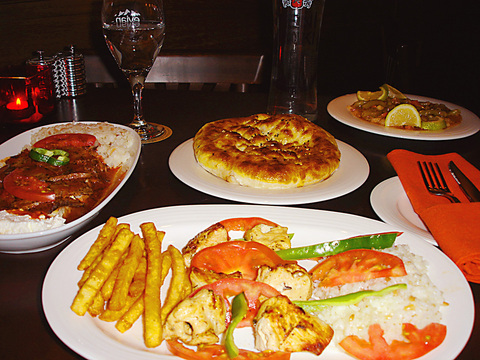In the movie Troy, Odysseus hatches a dastardly plan to breach the besieged city's defenses. The Greeks build a wooden horse within which Achilles and a batch of soldiers hide, and the unsuspecting people of Troy take the horse into the city with dire consequences.
The plot works, Troy falls, and the movie suggests that this was the birth of the Greek nation.
Troy is now in Turkey.

PHOTO: STEVE PRICE, TAIPEI TIMES
Marketing savvy Timucin Ozcan named his new restaurant Truva, the Turkish word for Troy, and uses the Trojan horse as its logo. "I wanted to open a restaurant that reflects the true nature of the Turkish people," he said.
Truva has been open three months and has attracted a lot of local publicity. Ozcan brought in two Turkish chefs and designed the menu to reflect different types of cuisine from his native country.
A new homestyle cooking section will be added to the menu this month to supplement the current selection of Turkish food.
The decor is stylish, with atmospheric lighting, dark wooden tables and chairs. Throughout the restaurant there are references to Turkey such as a traditional dress hung in a glass case above the staircase, the national flag attached to the ceiling and an Ottoman-style rug hung on the wall.
Appetizers include spicy vegetable salad, tarator (which is yoghurt curd topped with garlic and walnuts) and egg plant salad. The main course options are dominated by kebabs and pita bread pizza.
The most famous kebab, or perhaps the most infamous, is the doner kebab. In many European cities it is associated with greasy sidewalk stalls serving up slivers of stringy meat on a thin, hard pita bread.
Truva, however, presents the doner kebab in a more traditional way. The beef that is used to form the large rotating tower of meat is marinated for one day in yoghurt and herbs, including mint. Slices are carved off and served on a soft herby pita bread. The dish is accompanied with homemade sour yoghurt. The slices of beef although cooked through are surprisingly tender, and a dollop of yoghurt augments the dish into a mouthwatering treat.
Dessert includes Turkish ice cream made using orchid root: the resulting texture is thick and creamy.
Truva has a wide selection of wines and and serves Raki, a Turkish liquor that packs a punch and has an intense licorice flavor.

Towering high above Taiwan’s capital city at 508 meters, Taipei 101 dominates the skyline. The earthquake-proof skyscraper of steel and glass has captured the imagination of professional rock climber Alex Honnold for more than a decade. Tomorrow morning, he will climb it in his signature free solo style — without ropes or protective equipment. And Netflix will broadcast it — live. The event’s announcement has drawn both excitement and trepidation, as well as some concerns over the ethical implications of attempting such a high-risk endeavor on live broadcast. Many have questioned Honnold’s desire to continues his free-solo climbs now that he’s a

As Taiwan’s second most populous city, Taichung looms large in the electoral map. Taiwanese political commentators describe it — along with neighboring Changhua County — as Taiwan’s “swing states” (搖擺州), which is a curious direct borrowing from American election terminology. In the early post-Martial Law era, Taichung was referred to as a “desert of democracy” because while the Democratic Progressive Party (DPP) was winning elections in the north and south, Taichung remained staunchly loyal to the Chinese Nationalist Party (KMT). That changed over time, but in both Changhua and Taichung, the DPP still suffers from a “one-term curse,” with the

Lines between cop and criminal get murky in Joe Carnahan’s The Rip, a crime thriller set across one foggy Miami night, starring Matt Damon and Ben Affleck. Damon and Affleck, of course, are so closely associated with Boston — most recently they produced the 2024 heist movie The Instigators there — that a detour to South Florida puts them, a little awkwardly, in an entirely different movie landscape. This is Miami Vice territory or Elmore Leonard Land, not Southie or The Town. In The Rip, they play Miami narcotics officers who come upon a cartel stash house that Lt. Dane Dumars (Damon)

Today Taiwanese accept as legitimate government control of many aspects of land use. That legitimacy hides in plain sight the way the system of authoritarian land grabs that favored big firms in the developmentalist era has given way to a government land grab system that favors big developers in the modern democratic era. Articles 142 and 143 of the Republic of China (ROC) Constitution form the basis of that control. They incorporate the thinking of Sun Yat-sen (孫逸仙) in considering the problems of land in China. Article 143 states: “All land within the territory of the Republic of China shall